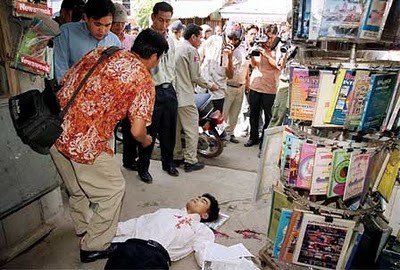Ahead of the 10-year anniversary on Wednesday of the assassination of Free Trade Union (FTU) President Chea Vichea, police said Monday that despite their inability to bring anyone to justice for the high-profile slaying, the case remains open.
However, Chea Mony, the brother of Chea Vichea, reiterated his long-held belief that the government covered up the killing of his sibling.
“I think that the murderers are protected by their master, which is the government; if they did not have a master, they would be arrested,” said Mr. Mony, who went on to replace his brother as president of the FTU in 2004.
“This is the inability of the authorities,” Mr. Mony said.
“If the government reforms the court system, I will file a complaint to the court again, because now the court is corrupt and it belongs to the Cambodian People’s Party,” he said.
Two scapegoats for the murder, Born Samnang and Sok Sam Oeun, each served five years in prison before they were finally released on the order of the Supreme Court due to lack of evidence.
When asked Monday why no one had yet faced justice for killing the country’s highest-profile union leader 10 years ago this week, Lieutenant General Mok Chito, director of the Interior Ministry’s Judicial Central Department, said an investigation was ongoing.
“In general, our authorities continue to investigate,” Lt. Gen. Chito said Monday.
Lt. Gen. Chito referred further questions to former Phnom Penh police chief Heng Pov, who initially led the investigation into the killing of Chea Vichea.
Heng Pov, who arrested the now-acquitted Mr. Samnang and Mr. Sam Oeun, declared the case closed.
Heng Pov was later promoted to undersecretary of state at the Interior Ministry, as well as an adviser on security to Prime Minister Hun Sen, before he fled the country ahead of a slew of serious crime charges.
While on the run in 2006, Heng Pov told French magazine L’Express that late National Police commissioner Hok Lundy —one of Mr. Hun Sen’s closest allies—had told him to frame Mr. Samnang and Mr. Sam Oeun for the killing.
Heng Pov is now serving a 100-year prison sentence at Prey Sar prison for a raft of crimes that includes the murder of a municipal court judge. Since his arrest and deportation back to Cambodia, which was personally overseen by Lt. Gen. Chito, Heng Pov has never commented further on the killing of Chea Vichea.
But beyond the tragedy of Chea Vichea lies a litany of other “unsolved” cases: the murders of two other FTU leaders, 11 journalists, opposition party politicians and supporters, and garment factory workers.
Such cases have never been independently or credibly investigated by police, rights workers say.
Local human rights group Licadho has identified 10 fatal shootings by police or military police between 2012 and 2013 alone—none of which have resulted in a “credible prosecution or investigation.”
“Despite a progressive Constitution and ratification of most international treaties and conventions, the Cambodian government has systematically allowed law enforcement, military personnel and high-ranking government officials total impunity for the past two decades while its citizens are beaten, shot dead, wounded, arrested and sent to prison for only trying to raise critical social and human rights issues to the public,” Licadho director Naly Pilorge said.
Sok Sam Oeun, executive director of the Cambodian Defenders’ Project, said a lack of medical and forensic expertise on the part of the police hinders the investigative process, but politics was an even greater concern.
“Right now I see that the police are looking like they belong to one political party,” he said.
“So if the high-ranking officials are involved with a crime, the police don’t dare to touch that case. Even if they are not government officials, even if they are ones who support their party, the police don’t dare to touch the case.”
Eleven journalists have been murdered in the line of their work since 1994. FTU leader Ros Sovannareth was shot dead, execution-style, in Phnom Penh four months after Chea Vichea was shot in 2004. Fellow FTU leader Hy Vuthy was similarly gunned down in 2007 outside a factory.
In addition, killings of civilians by the police and military have continued apace, from the May 2012 killing of 14-year-old Heng Chantha in Kratie province during a mass eviction that was described as an operation against a rebel movement, to the September and November 2013 killings of two bystanders during protests, to the daylight gunning down by military police of five protesting strikers on January 3.
Though almost no such killings in the past decade have been solved, Lt. Gen. Chito said that investigative committees had been established in all cases.
“In all cases that have occurred, the Interior Ministry’s authorities always investigate them, so we cannot comment in detail about those cases,” he said.




